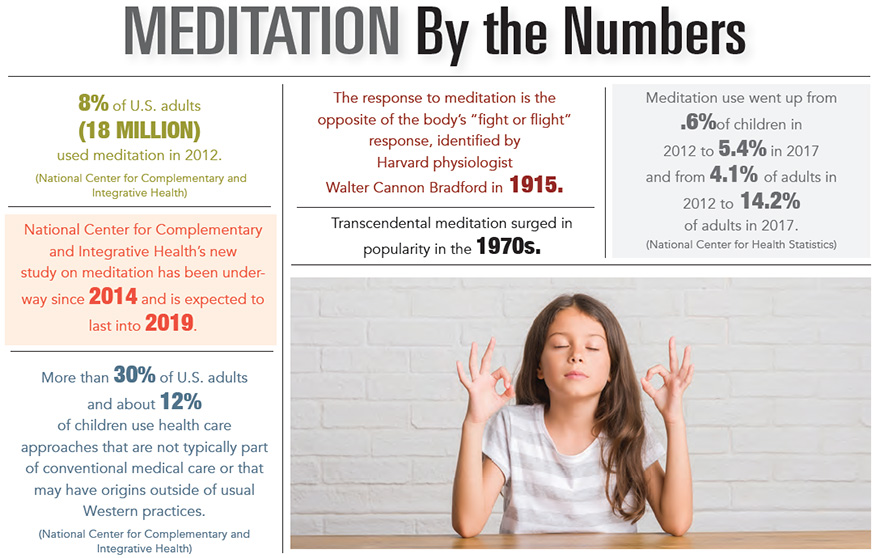Chances are, you’ve recently indulged in some meditation without knowing it. Maybe you gazed at the water cascading down the shower wall for a few minutes, your thoughts blank. Or maybe you spent a few extra moments in bed, not reaching immediately for a phone on the nightstand but focusing on light seeping through the blinds. Meditation is easy – and most of us have done it – but intentional meditation takes the practice to a whole new level and can actually make a difference in your well-being.
What is meditation, exactly? It’s the act of relaxing your mind by focusing it on something specific, which slows down the brain waves.
The term “mindfulness,” often used in conjunction with meditation, simply means being fully present in a moment, something that sounds easy but is often difficult for all of us to master in today’s fast-paced world. But with practice, the art of meditation gets easier, and its benefits become apparent.
One benefit earning more attention lately is pain management, whether emotional or physical. More medical professionals are suggesting mindfulness activities to patients who struggle with chronic conditions.
When we experience pain, there are two different responses in the mind and body – primary and secondary. Primary is the nervous system’s response to stimuli, and secondary is the perception of that pain. And while primary pain cannot always be stopped or controlled, secondary pain can. That’s where meditation comes in.
“Meditation affects consciousness, or, more simply, increases the awareness of the various functions and systems within the body,” said Andrew Shykofsky, owner and primary instructor at Meditate: Center for the Healing Arts in Charleston.
“While an individual may not have a choice as far as the pain they are feeling, they will have a choice as far as the attitude they adopt. If we have no consciousness of that choice function, we tend to feel powerless, which will amplify the pain,” he noted.
A simple meditation practice can redirect our focus from physical pain, and it need not be anything fancy. Simply find a quiet space, get into a comfortable position and, instead of focusing on physical pain, redirect mental focus onto breathing, eventually expanding to feelings of peace and self-compassion.
“Spend three to five minutes meditating on any aspect of your life you want to explore,” Shykofsky suggested. “Meditate upon areas of your life where you feel uncertainty or conflict. Aim to maintain calmness both mentally and emotionally as you contemplate the topic.”
Meditation also can help those who suffer from depression and anxiety. Many people are dependent on antidepressants, but, with practice and dedication, meditation can divert attention from mental pain and anguish and become an alternative form of relief.
“Meditation brings us face to face with the limitations in our understanding and helps us choose a different way to look at our situations,” said Shykofsky. “These new perspectives tend to bring hope, which can immediately shift us away from negative emotions that grow in an environment of depression.”
Still skeptical about the benefits of meditation and whether it can make a difference to your total wellness? Try it anyway – and stick with it, according to Shykofsky. There’s bound to be benefits, even if ditching your medication completely and going totally holistic isn’t feasible at first. Dialing back the use of prescription drugs, even just a bit, is certainly worth it.
“I believe meditation in certain conditions can negate the need for drugs,” Shykofsky declared. “Meditation can serve as a tool to reprogram the mind and emotional system to function differently.
“Even though in my 14 years of teaching, 75 percent of those who start out learning give up before developing consistent practice, success is absolutely possible! A person reaches a more dedicated state generally because they have truly become fed up with drugs and want a healthier alternative,” he concluded.
By Denise K. James

